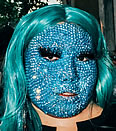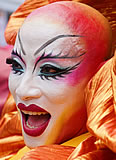
Celebrating
30 YEARS
of Service to Asia's
Gay & Lesbian Community!

|
Covid Recovery Discount: to help build your business back up, we are offering a 50% or higher discount off 12 months on any of our promotions !
|
|

 | |
|
1996 Chinese Tongzhi Conference Manifesto
About 200 Chinese tongzhi (lesbians, bisexuals, gays and transgendered people) from different regions gathered in Hong Kong to participate in the "1996 Chinese Tongzhi Conference" from Dec 6 - 8,1996. The Conference discussed a number of tongzhi-related issues, including culture and arts, social services, AIDS issues, bisexuality, and lesbian politics. There was an extensive discussion
regarding the specificity of the cultural context and needs of Chinese
tongzhi. Participants concluded that it is unnecessary to copy the model
of les-bi-gay liberation movement in the Anglo-Saxon societies,
which is characterized by individualism and confrontational politics and
agreed that Chinese tongzhi movement should be cultural-specific.
Manifesto of Chinese Tongzhi Conference
- Same Sex Love Always Exists
Same sex Love has existed in all cultures since ancient times.
Scholars find that many cultures are tolerant towards
homosexuality and bisexuality. In addition, sexual behavior among members
of the same sex has been observed in animals. The authoritative Kinsey
Report revealed that of the nearly ten thousand adults being interviewed,
approximately 10% were classified as homosexuals.
- Same Sex Love is Being Discriminated Against
Regardless of the number of homosexuals and bisexuals in the world, the
issue is whether this group of people is being discriminated against by
the mainstream society. The contemporary society remains heterosexist. The
mainstream sexual discourses in mass media, the educational system and legal
structure is predicated upon a reproductive, monogamous social structure.
The les-bi-gay world is often being viewed in a voyeuristic, derogatory
way. This causes many tongzhi to feel ashamed and guilty. Many tongzhi
have to disguise themselves as "normal" heterosexuals in the public and lead a
secretive double-life, which can cause destructive psychological damage
to their personal development.
- Traditional Chinese Society was Tolerant Towards Same Sex Love
Many people mistakenly criticize Chinese culture as sexually repressive
and conservative. Some even think that homosexuality is a corrupt import
from the West. In fact, traditional Chinese culture was tolerant towards
same sex love. Mencius says, "The joy of eating and sex are natural human
desires," both of which have no association with sin or guilt. Buddhism, a
religion which has been well assimilated into the Chinese culture for
2,000 years, neither advocates heterosexuality nor denounces
homosexuality, and emphasizes the notion of bodichitta, which means that
all beings have the potential to become Buddha. Historical documentation
also reveals the high level of social tolerance towards same sex love in
pre-modern China.
- Hostility and Violence Against Homosexuality is not Found in
Traditional Chinese Culture
Hostility and violence, such as harsh legal punishment, bashing or
lynching of same sex lovers cannot be found in
historical records of pre-modern China. For instance, the introduction of a sodomy law in Hong
Kong in 1865, which could sentence two consenting male adults to life
imprisonment, was the result of British colonial rule. What was brought
from the West to China was not same sex love, but
the sin associated with it in the Judeo-Christian tradition, which
significantly contributed to the homophobia found in modern Chinese
societies.
- Increased Exchanges Among Tongzhi in Chinese Societies is Beneficial
In recent years, there have been encouraging developments in the tongzhi
communities of mainland China, Taiwan and Hong Kong. Cultural exchanges
among tongzhi in different Chinese societies can help tongzhi to reclaim
self esteem and to develop a healthy personality. Moreover, the accurate
representation and positive visibility of the tongzhi community can
correct misunderstandings of the mainstream society.
- Confrontational Politics in the West Should Not be Imposed Upon
Chinese Societies
The les-bi-gay movement in many Western societies is largely built upon
the notion of individualism, confrontational politics, and the discourse
of individual rights. Certain characteristics of confrontational
politics, such as "coming out," mass protests, and parades may not
be the best way of achieving tongzhi liberation in the family-centered,
community-oriented Chinese societies, which stress the importance of
social harmony. In formulating the tongzhi movement strategy, we
should take the specific socio-economic and cultural environment of each
society into consideration.
- We Should Respect Each Other Regardless of Sexual Orientation
We are a group of Chinese tongzhi, unashamed and proud of who we are. While
we do not deny our sexual orientation, we do not advertise the sexual
aspect of our life. If the society can deal with this issue without
prejudice, everyone, tongzhi or otherwise, need not highlight her or his
sexuality. People should respect each other as individuals, regardless of
sexual orientation and other social differences. With this goal in mind,
together we can build a better society.
![[BACK A PAGE]](backm.gif) ![[HOME PAGE]](homopage.gif)
|
|




Phnom Pehn's gay men-only boutique hotel, spa, pool and restaurant...

|


QUNCI VILLAS, a gay-friendly, gay-managed tropical resort on the heavenly island of Lombak, just next to Bali...

|



At Bangkok Pride (photo: Amp Puttipong)

|


At Bangkok Pride (photo: Siam Pride)

|


At Bangkok Pride (photo: Siam Pride)

|


At Bangkok Pride (photo: Siam Pride)

|


At Tokyo Rainbow Pride

|


Dynamic duo at Cambodia Pride
 |


Special photo exhibition by Mark Leighton!

|
|










